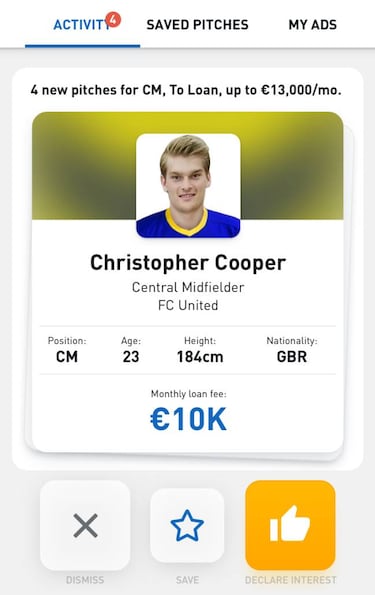TransferRoom - the transfer market goes digital
Representatives of 140 football clubs, including Manchester United, Atlético Madrid and Juventus, attended a summit in Madrid with the aim of buying, selling and loaning players.


In 2016 Jonas Ankersen, an entrepreneur and lifelong football fan, reckoned he had spotted a gap in the football transfer market. Clubs were spending huge sums of money on buying players – nearly 4.5 billion euros worldwide that year – yet the way of actually carrying out those transfers was still much as it had always been, often relying on agents to introduce deals, with clubs having little contact between them and no centralised way of knowing which players might be available, or which clubs were looking for talent. These inefficient methods rack up major costs to cover intermediaries in each deal, calculated as being some 12.5% on top of the transfer fees - around 560 million euros in 2016.
The solution: a digital platform where clubs could speak to each other directly. "Online marketplaces have already changed many industries and made them more efficient," says Ankersen. Examples abound: Uber and Cabify for rides, Airbnb for short-term property rentals, Shopify or Ebay for online shopping, Tinder for dating...
After a year talking to football clubs, in 2017 Ankersen founded TransferRoom.com, which is both a software product and social network, to "give the clubs a chance to take back control of the transfer market," he says, with the aim of reducing the cost of intermediaries and making the buying, selling and loaning of players faster and more efficient.
TransferRoom: 550 clubs and counting
Two years later and nearly 550 clubs from around the world, including Manchester United, Juventus and Barcelona, have subscribed to the platform, and over 300 deals have been facilitated directly on the website and app.

Subscriptions to TransferRoom cost between 5,000 and 15,000 euros per club per year, depending on exactly which features of the platform a club enables. The cost also includes invitations to the company’s three annual events, a summit in each of November and March and a 'Deal Day' in July, which are the "only transfer focused events in football exclusive to clubs and decision makers," says Ankersen.
The most recent of these took place last week at the Marriott Auditorium in Madrid with 170 sporting directors, heads of recruitment and club presidents from 135 clubs, including England’s Manchester City, Real Betis from Spain, DC United from the USA and Brazil's Sao Paulo in attendance.
In addition to face-to-face meetings with other clubs, the events include talks from leading football experts. Here in Madrid, TransferRoom had invited the European Club Association (ECA) to discuss the latest challenges facing football clubs, including new rules on loaning players, the impact of Brexit and other hot topics.
Football's speed dating
After the talk and a Q&A session with the ECA representatives, it was down to business. The format is simple: each meeting runs for exactly 15 minutes and over the two days each club organises up to 20 meetings with other clubs they are interested in getting to know or do business with - a buzzer goes to signal the start and finish of each meeting. The comparison to speed dating is hard to avoid.
A sports director might be sitting down with the CEO of Boca Juniors at 14:00, then discussing loan opportunities for an up-and-coming right-back at 14:15 with an executive from Atlético Madrid, before making moves for one of CSKA Moscow’s surplus-to-requirement strikers at 14:30... "It's a way of strengthening relationships. It's speed-training, it's 15 minutes, the buzzer goes, and you get down to business very quickly," says Dougie Freedman, sports director at Crystal Palace.
Simon Mesfin, sports director at five-time Norwegian champions Lillestrom, currently 11th in the Eliteserien, enthuses over TransferRoom in the conference's main reception room where the attendees go to have a drink and mingle after the first day’s speed meetings are over.
"I think it’s fantastic," says Mesfin. "It's so efficient. You can divide it into two parts. One is the platform - on your laptop or your iPhone – and the unique thing is you can get in touch with clubs from all over the world, saving time on travelling. It's really efficient." The other part of the equation are the events, "which are just as important, because you can speak to people face-to-face, saving time on messaging.
"Another great thing, for example, is having clubs from the MLS here - that's a really interesting market for us in Norway - with the salary cap they need to bring in potential players for the future rather than just the great players like the Wayne Rooneys and the Zlatans. Being able to just come here to Madrid rather than travelling all around the US is great," says the 39-year old executive. He’s also a fan of the ability to organise friendly matches through the platform.
The Lillestrom employee had several objectives at the conference: "I had clubs I specifically wanted to talk to today, and in particular I wanted to connect to new countries, new leagues and new clubs, to expand my network, so that in the future I might be able to make deals." An example of a new country? "Latvia," he says happily.
A new way of doing transfer business
Discussing TransferRoom, one question keeps cropping up. If the concept behind the platform is so good, why did it take so long to appear? Mesfin agrees: "I ask myself, why hasn’t anyone done this before? For many years we’ve seen the money going around in European football and intermediaries taking a part of it - so why didn’t anyone think to connect clubs like this, in a way that’s so efficient." He thinks it might be that because while some elements of the football industry are now incredibly modernised, many areas are still done the way they've always been. "In some areas of football we’re really smart; in others not so smart," he concludes.
TransferRoom CEO Ankersen says that when he was doing market research before setting the company up, many of the clubs he spoke to told him, "This is great. This is an ideal world, but it’s never going to work. Clubs are used to working in one way and they are not ready to change." The executive admits that many of the clubs who use the platform did have to change their habits to make it work, but they did and "it's happened fast."
"Time and trends are working in our favour. Technology is fitting into football clubs today and they are working more and more online. Everything is becoming more and more efficient," according to Ankersen. As an example of that efficiency he cites the case of a club making a player pitch and receiving interest in a deal just one minute and 52 seconds later, or Leeds United being able to do five deals in five weeks on the platform.
The role of agents
The losers from this efficiency are likely to be those agents who were previously involved in setting up these deals. Norwegian Mesfin agrees, to a certain extent: "I don't think clubs will get rid of agents, but rather we [the clubs] will talk to each other directly in the early process, and then the agents will come in at the next stage, to discuss salary and other things.
"Up to now the agent has been involved from the very early stages, sometimes even pitching the player, but you don't even know if that player is actually available. It can happen that they aren't. And it could be that the agent was right – they were told the player was available - but the club later changed their mind. Overall, when you talk to the club directly in the early phases it can be a lot more efficient."
Bloomberg... for football clubs
Related stories
From the attitude of the attendees in the conference suite at the Marriot in Madrid, TransferRoom looks like it is here to stay and given the success of online platforms in so many different markets across the range of human activity will only go from strength to strength. Asked if he will be keeping his subscription, Mesfin explains that not only will Lillestrom be staying on the platform, he’s been recommending that the entire Norwegian league buys a subscription together so every club has access to it.
As to his plans for TransferRoom, Ankersen says: "We want to build a complete solution for clubs, so they have real-time access to all necessary market data and make TransferRoom as important and efficient for clubs as Bloomberg is for a financial trader."